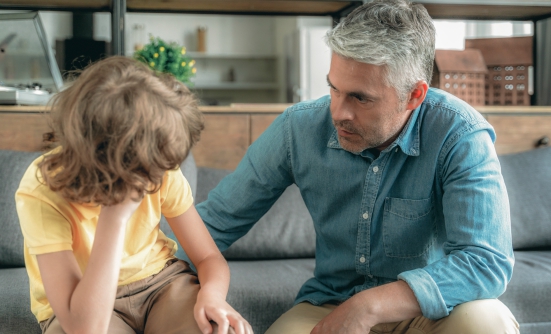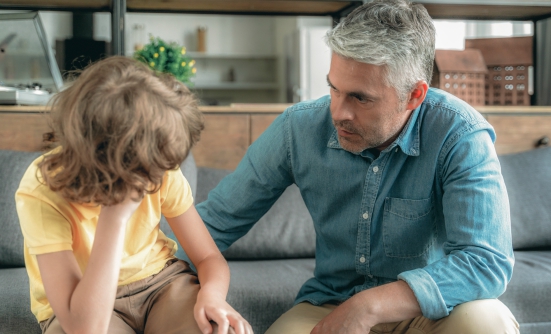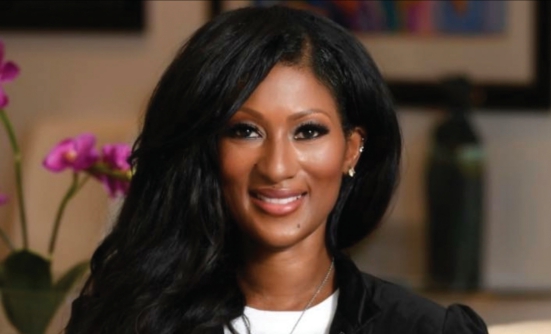
It is 1971. A veteran of 3 wars, WWI, WWII (both theaters), and Korea lies in a hospital bed in New York City. In his time as a soldier, he won 2 Bronze Star Medals for valor in combat zones. Between wars, he worked at the New York power company Con Edison splicing electric cables with millions of volts of electricity coursing through them when they were electrified. Now, as my grandfather lay there, he, a man not lacking in courage, could not find a way to tell his 7-year-old grandson that he had metastatic bladder cancer. Instead he told me he had been hit on the head with a falling brick.
That was the last conversation I ever had with him. I hope I told him I love him. I’m pretty sure he knew anyway, and that comforts me.
People diagnosed with cancer face a second daunting challenge if they have children in their lives. How do you tell a child that their loved one is seriously ill in a way that won’t be destructive? When do you tell a child? At the time of diagnosis or final prognosis? How do you tell a child? Do you do it all at once or unfold the truth as you go and find your way?
Complicating this is that, as any parent will tell you, one size does not fit all. In addition to the huge range of ability to understand the situation just based on age, different children are different in so many ways. Even siblings who are close in age and development have temperaments that vary widely. What would be a shrug to one child might be shattering to another. So how do we best approach this very sensitive and complicated subject?
I’ll start by saying there is not a “right” answer here. I can offer general principles, but then it’s up to you to apply them.
Following are some ideas on how to manage this difficult situation.
Take Stock of the Situation
First, take stock regarding the extent of the problem. If the person with cancer has skin cancer that had completely clear margins after biopsy (Read: excellent prognosis for cure), it will be a different conversation than if there was a late finding of advanced cancer.
Next, take stock of the child involved. Age is a consideration. Some children are very resilient and some are more fragile. Typically they know more than we think they know and are stronger than we appreciate.
Finally, take honest stock of yourself. This will be the hardest thing to do. None of us are ever as good as we think we are at covering our worries or managing our emotions, especially with our kids. Ask yourself if this is a conversation you can have constructively. You may not be able to because either you aren’t in an emotional state to do so or you simply don’t communicate well. If this is the case, don’t hesitate to involve a specialist either for yourself before having this discussion, for your child while you are having the discussion, or after or both.
Speak Plainly, Don't Use Euphemisms or Metaphors. Don't Lie
George Bernard Shaw once wrote in 14 words the best summation of problems with communication I’ve ever seen. He said, “The single biggest problem in communication is the illusion that it has taken place.”
We all have a habit of using euphemisms to cover things we don’t feel comfortable saying. Instead of “I need to urinate,” we say “I have to go to the restroom” or “I’m going to the bathroom” when we are neither going to rest nor bathe. Perhaps you say “Nature calls” or “I have to go powder my nose.” We use these so commonly we don’t even think about them. When we talk about sex with our kids, we often call it “The Birds and the Bees” or “The Facts of Life” and, as an emergency department doctor, I won’t get started on the number of euphemisms I’ve heard for sex itself.
Start by asking what your child knows about cancer. They may have had a schoolmate who had a loved one with the disease. As one-third of all Americans will ultimately have cancer, there are fair odds this can be the case. This brings up a potential complication: if the person who had cancer has died, your child may assume cancer is uniformly fatal. However, it uncovers a potential misperception, and you can let your child know people are cured of cancer every day.
Let a younger child know that cancer is a disease where some cells that make up our body grow too much, and it causes problems with the normal working of the body. If the bad cells grow too much, they can cause death, but there are a lot of things doctors can do to cure the problem.
If the child is older, expand on the type of cancer, such as it’s lung or liver cancer, etc. You can also explain potential treatments, such as surgery, chemotherapy, etc.
If the child is older, expand on the type of cancer, such as it’s lung or liver cancer, etc. you can also explain potential treatments, such as surgery, chemotherapy, etc.
Consider carefully any answer you give to hard questions. Your child may ask you questions you are not ready to answer, especially if the cancer prognosis is poor. Don’t lie to avoid giving a hard answer. It may be that you can’t give the hard answer right then and there. Tell your child that you can’t answer that question right now, but as soon as you are able to, you will. Tell them you will find out together.
Adjust the Conversation As You Go
Children, like most adults, will not be able to process everything you have to say all at once. This is a play-it-by-ear situation. Start the conversation, then stop and let the child process for a bit before starting again later. Less is more here. It’s better to undershoot than overload. You can always add more when the child is ready. When you come to a stopping point, make sure they understand that there is more to the conversation, but for now you’ll stop here. Encourage them to return to the conversation when they are ready. Allow them to and expect them to ask questions.
Have the Child Explain Things Back to You
You may think you’ve been clear, but it’s amazing how much gets misinterpreted, especially under duress. It’s always been puzzling to me that I can tell someone in the emergency department, for example, that after they were brought in at significant speed, lights blazing and sirens wailing, that they’re having another heart attack and that, at 3 AM, we’re waking up the cardiac cath team and a cardiologist who will be taking them immediately to a cath lab. Only to be asked, “So do I have to stay tonight?”
What is clear to adults is not always clear to children. We had a young man come in with a minor fracture of his forearm. It was a very minor injury that would require only a cast for a few weeks, and he’d be fine. No surgery or even reduction in the emergency department was needed. I explained all this, but he remained in tears. I asked him if he was still in pain, and he said “No, I just don’t want to lose my arm.” At no point had anyone even suggested surgery as a possibility. The whole of the conversation was about how minor this was, and how well he was expected to do. He probably didn’t hear a word of that as he was focused on this fear of losing his arm.
So in a gentle way, ask the child to explain what they think is going on. Correct misunderstandings early on.
Have a Next Thing
Having this conversation will be taxing. Plan something for afterward if at all possible. Go out for pizza or a movie; don’t overdo it. Stay away from grand gestures. For example, this would not be the time to go to that super special place your child has always wanted to visit. The association with being told about the cancer will always taint a positive memory. Keep it mundane, but nice/fun. The goal here is not to get stuck in heavy feelings.
This Is Not a Punishment From God
Be very clear that the child did not have anything to do with this happening. This isn’t a punishment from God for bad behavior, either on the part of the patient or the child. Nothing they did made the family member sick. If you have someone who promotes that point of view, keep them away from the child to the extent possible. If you can’t, reinforce that it’s an opinion, not a fact and not your family’s opinion either.
Be very clear that the child did not have anything to do with this. This isn’t a punishment from God for bad behavior, either on the part of the patient or the child.
Forecast As Honestly As You Can
To the extent possible, let the child know what comes next. If it’s chemo, and there is an expectation of hair loss, let the child know. Also, help them understand that even though we know it may happen, the family member may be upset when it does, as might others in the family. Let them know that some days the family member undergoing care is going to be in a bad mood. It won’t have anything to do with them. Which brings us to…
Involve Your Child in Some Care-Related Things
Younger children can draw pictures as day brighteners. Older children can help out with chores. Young drivers can chauffeur to appointments or run errands. Don’t overload the child, but rather give them some participation in making mom or dad well again. The caveat here of course is if mom or dad are not going to get better, then couch it as “Make mom or dad feel better.”
I can’t advocate here for direct patient care such as toileting or cleanups; even feeding (vs making a meal) would be questionable. Generally speaking, this is too much even for adult children and a fair number of spouses I’ve encountered. I’d also advise against placing the child in any situation where they would be responsible for an emergency of any sort. When an emergency arises, people don’t always respond logically, and often the response to an emergency causes more problems than the emergency itself. As a Star Trek fan, I recall a great exchange between Kirk and Spock early in the second movie “The Wrath of Kahn” when they were about to go out to a distress call with a very green crew.
Kirk: How will they respond under real pressure?
Spock: As with all living things, each according to his gifts.
That’s always stuck with me. Being able to manage an emergency takes training, and some people are naturally disposed to functioning well in emergencies. For some people, no amount of training will ever get them there. Avoid putting anyone in that situation if at all possible. 911 is always there for guidance, and EMS crews respond to such situations all the time. Better to call and not need rather than need and not call.
Keep an Ear to the Ground
Keep in contact with your child’s network of adults, such as teachers, for an early warning of problems. You may not want to fully disclose the diagnosis to the faculty. You can simply say we have a situation at home that is affecting my child, please let me know if there are any negative changes in their behavior.
Don’t change your parenting style. Constancy is important now, so continue to parent your child with the same rules and consequences as always. Suddenly allowing significantly loosened rules (or none at all) is a recipe for problems at a time when you least need new ones.
Listen More Than You Talk
Throughout the whole process, listen more than you talk. Answer questions and be honest about what you don’t know. If a cure is likely, that should be easier to tell the child, but let them know it’s not always the case. If cure is unlikely, this will be harder of course. If, despite a poor prognosis, you’re going to treat, tell them that you’re going to put up a fight. If the decision is not to treat, the focus will need to be on maximizing the time left. This will be a hard conversation to have with younger children. The important thing to convey is that there isn’t anything the child did or can do to change the outcome. Focus on being with the person while you can. If you have a strong religious belief, the notion that the person will be out of pain when they are with God can be comforting. The idea of reunion can be comforting as well if you believe that we are reunited with loved ones after we die.
I do.
Bring In Help
I mentioned this earlier, but I think it needs its own section. I’ve seen a lot of reaction to grief and fear over the 44 years I’ve been at this. There is no right or wrong way to react, although I can say some are more productive than others. Children will have to live with the advent and outcome of a parent with cancer for the remainder of their lives for better or worse. While we are trying to make the patient well, we also must work on keeping the children from being impacted any more than absolutely necessary. I suppose there are some families that are “Walton wise” (the TV show, not the retail chain), where the older folks in the family have an unending fountain of life’s wisdom, and every situation is resolved neatly and nicely with smiles all around and a reassuring good night roll call.
I have yet to meet them though.
The rest of us do what we can with what we have. Just like a plumbing job or repair work on the house can fall outside our abilities to do it correctly, we need to realize that it’s highly likely that guiding a child through the minefields of a cancer diagnosis in a loved one is probably outside our wheelhouse.
Get help.
Don’t wait until damage is done, if your loved one gets a cancer diagnosis and has young children, expect that they will need counseling and start it early on. This can save a great many problems later. Traumatized children may (and have) turn to drugs and alcohol and take up other negative behaviors that have lasting effects. If the cost for counseling is an issue, talk to your nurse navigators. Often family counseling is included in care. Alternatively, call 211, the nationwide resource hotline. Tell the 211 operator your zip code and needs, and they’ll have a list of potential options.
Be cautious of anyone who promotes prayer alone, especially for those who stand a good chance of cure. Some faith traditions are opposed to modern medicine despite its advances in cancer care. Prayer is a good thing, but James 2:17-26 tells us “Faith without works is dead.” You can find similar sentiments in most major world religions. Prayer, while powerful, must be joined with acts. We do not want a child coming away from the experience feeling if only they had prayed more, mom or dad would still be alive.
Summation
Dealing with children whose parent or other loved one is diagnosed with cancer is an often overlooked aspect of cancer care. We want our children to be well regardless of what happens to us. Patients even feel guilty for being sick, even though it’s well outside their control that they did so. If the child is not doing well, this can negatively impact the patient’s well-being and outcome. Cancer treatment requires a total focus, but we all know that if our child really needs something, we will make that our priority even to the detriment of our care.
Managing the family well-being, and specifically a child’s well-being, during care is an important part of care. It can give us strength when strength is gone to know that we’re not just fighting for ourselves. This is not an exhaustive list, but in the space we have here, it is a good start.
With appreciation for the contributions of Dr. Samantha Scott and Dr. Karen Martin to this article.
About the Author
Kerry Forrestal, MD, MBA, is an emergency medicine physician in Salisbury, MD, and author of Crushing Cancer: A Patient’s Complete Guide to Managing a Cancer Diagnosis.









